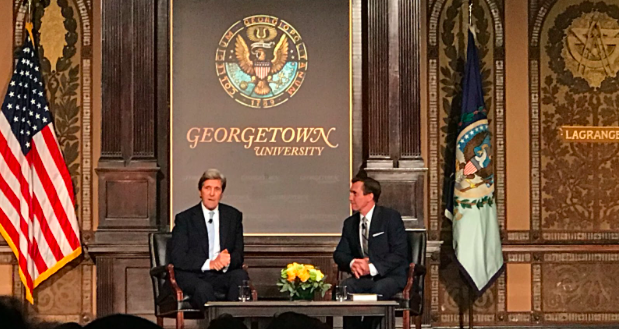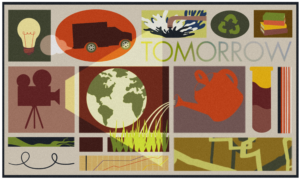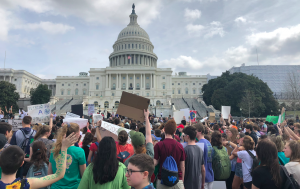American democracy is in trouble, warned former Secretary of State John Kerry at an event in Gaston Hall on Oct. 4 hosted by Georgetown’s master’s of Science in Foreign Service program.
Kerry was joined by John Kirby, an adjunct lecturer in Georgetown’s Journalism program and former spokesperson for the U.S. Department of State, to discuss Kerry’s new autobiography, Every Day Is Extra.
“There is an absence of leadership that is prepared to hold people accountable to uphold their oath of office,” Kerry told the audience. He added that growing up with parents from the “Greatest Generation” imbued him with a sense of responsibility and service to country that is becoming increasingly absent in our political discourse and structure.
Kerry pointed to congressional gridlock, big money in politics, gerrymandering, and extreme partisanship as the biggest threats to the American democratic process, noting that some politicians today, “are more beholden to protect their power, party, and president than they are to uphold their oath of office.”
With the 2018 midterm elections approaching, Kerry also stressed the importance of young people in democracy and creating progress, drawing on his own experiences as a young activist in the anti-war movement and a participant in the first Earth Day in 1970. Discussing the decline in national voter turnout, he urged students to “take their voting privilege seriously.”
“You all have an amazing power,” he said. “It was young people in the 1960’s and Civil Rights movement, young people in the women’s movement, young people in the environment movement, young people in the peace movement.”
Kerry also discussed global climate change, an issue to which, Kirby noted, he is no stranger. Kerry dealt with acid rain as the Lieutenant Governor of Massachusetts, attended the first Earth Summit in 1992 as a U.S. Senator, and spearheaded the 2016 Paris Agreement as Secretary of State.
“It’s so hard to convey fully the seriousness of this moment,” Kerry said.
And, while Kerry said he believes we are moving in the right direction, he fears it is not enough. Kerry did not hide his concern for the likely catastrophic environmental repercussions this will cause. He specifically noted President Donald Trump’s 2017 decision to withdraw the U.S. from the Paris Agreement.
“People are going to die,” Kerry said, “because the United States of America has given up its role in leadership.”
At the end of the discussion Kerry took a number of questions from students, ranging in areas from the Israeli-Palestinian conflict to the global rise of illiberal authoritarianism.
Grace Rector (SFS ’21) asked Kerry about his thoughts on the impact and implications of the US military-industrial complex. Rector noted that it prevents the U.S. from investing more in social sectors, as well as the fact that 80 percent of the arms the United States sells internationally go to non-democratic nations. Kerry responded by saying that he believes the current national military spending is justified as the U.S. tries to protect itself.
“I was disappointed with the secretary’s response,” Rector wrote in an email to the Voice. “Considering how much larger the US military industry is compared to every other country, I think the secretary didn’t support decreasing military spending significantly because our economy is dependent on military and so decreasing our sales of weapons would potentially hurt our economy.”
And for those wondering about the meaning of the title of his book, Kerry explained the significance of the quote, which he first heard in his service in Vietnam.
“‘Every day is extra’ is a statement that we who came back from those boats and from the rivers would say to each other, because we were lucky enough to make it back and a lot of people weren’t,” Kerry said.
Now, he chooses to live each day with this in mind: “Every day you got was extra compared to the others.”






